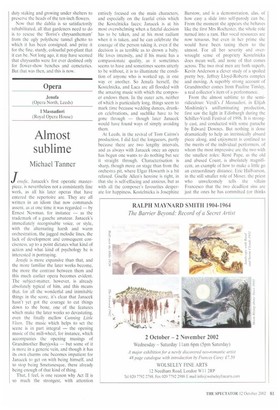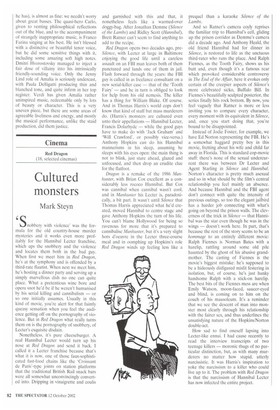Opera
Jenufa (Opera North, Leeds) I Masnadieri (Royal Opera House)
Almost sublime
Michael Tanner
Jenufa. Janacek's first operatic masterpiece, is nevertheless not a consistently fine work, as all his later operas that have entered the repertoire are. They are all written in an idiom that now commands assent, as at one time it was regarded — by Ernest Newman, for instance — as the trademark of a gauche amateur. Janacek's immediately recognisable voice, or style, with the alternating harsh and warm orchestration, the jagged melodic lines, the lack of development and consequent conciseness, up to a point dictates what kind of action and what kind of psychology he is interested in portraying.
Jenufa is more expansive than that, and the more familiar the later works become, the more the contrast between them and this much earlier opera becomes evident, The subject-matter, however, is already absolutely typical of him, and this means that, for all the wonderful and inimitable things in the score, it's clear that Janacek hasn't yet got the courage to cut things down to the bone, one of the features which make the later works so devastating, even the finally mellow Cunning Little Vixen. The music which helps to set the scene is in part integral — the opening music of the mill-wheel, for instance, which accompanies the opening musings of Grandmother Buryjovka — but some of it is more in a generic vein, and though it has its own charms one becomes impatient for Janacek to get on with being himself, and to stop being Smetanesque, there already being enough of that kind of thing.
That, I feel, is one reason why Act II is so much the strongest, with attention entirely focused on the main characters, and especially on the fearful crisis which the Kostelnicka faces; Janacek is at his most overwhelming when a fateful decision has to be taken, and at his most radiant when it is taken, and he can celebrate the courage of the person taking it, even if the decision is as terrible as to drown a baby. He loves intensity, and if his music has a compassionate quality, as it sometimes seems to have and sometimes seems utterly to be without, it is to illuminate the condition of anyone who is worked up, in one way or another. So Jenufa herself, the Kostelnicka, and Laca are all flooded with the amazing music with which the composer endows them. In the outer acts, neither of which is particularly long, things seem to mark time because wedding dances, drunken celebrations, and suchlike have to be gone through though later Janacek would have found ways of simply avoiding them.
At Leeds, in the revival of Tom Cairns's production, I did feel the longueurs, partly because there are two lengthy intervals, and as always with Janacek once an opera has begun one wants to do nothing hut see it straight through. Characterisation is sharp, though more on stage than from the orchestra pit, where Elgar Howarth is a bit relaxed. Giselle Allen's heroine is right, in that she is self-effacing and anxious, but as with all the composer's favourites desperate for happiness. Kostelnicka is Josephine Barstow, and is a demonstration, alas, of how easy a slide into self-parody can be. From the moment she appears she behaves like the first Mrs Rochester, the whole role turned into a rant. Her vocal resources are now tenuous, but even in her prime she would have been taxing them to the utmost. For all her severity and overwrought sense of propriety Kostelnicka does mean well, and none of that comes across. The two rival men are both superb, Kevin Anderson a clever study of a spoiled pretty boy, Jeffrey Lloyd-Roberts complex and moving. A superbly strong account of Grandmother comes from Pauline Tinsley, a real collector's item of a performance.
From the almost sublime to the semiridiculous: Verdi's I Masnadieri, in Elijah Moshinsky's unilluminating production, first saw the light in Edinburgh during the Schiller-Verdi Festival of 1998. It is strongly cast, and conducted with some panache by Edward Downes. But nothing is done dramatically to help an intrinsically absurd piece along, and enjoyment is confined to the merits of the individual performers, of whom the most impressive are the two with the smallest roles: Rene Pape, as the old and abused Count, is absolutely magnificent, an example of how to make a little go an extraordinary distance. Eric Halfvarson, in the still smaller role of Moser, the priest who unwelcomely tells the villain Francesco that the two deadliest sins are just the ones he has committed (or thinks he has), is almost as fine: we needn't worry about great basses. The quasi-hero Carlo, given to venting philosophical reflections out of the blue, and to the accompaniment of strangely inappropriate music, is Franco Farina singing at his best. He isn't blessed with a distinctive or beautiful tenor voice, but he did some sensitive things with it, including some amazing soft high notes. Dmitri Hvorostovsky managed to inject a fair dose of villainy into his intrinsically friendly-sounding voice. Only the Jenny Lind role of Amalia is seriously undercast, with Paula Delligatti producing thin and blanched tone, and quite infirm in her top register. Verdi has given Amalia rather uninspired music, redeemable only by lots of beauty or character. This is a very uneven piece, but there are some areas of agreeable liveliness and energy, and mostly the musical performance, unlike the staid production, did them justice.



































































































 Previous page
Previous page